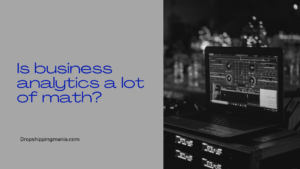Business Analytics

In today’s competitive business environment, having the right data and insight is key. Knowing what customers want, how to reach them, and understanding market trends are vital in making informed decisions that lead to success. Business in Analytic makes this possible by harnessing the power of data to provide actionable insights. In this blog post, we will discuss the importance of this and how it can help organizations gain a competitive edge in today’s marketplace. Learn about the different types of analysis available, how it helps make better decisions, and how you can get start using business analytics today.
What do business analytics do?

Business in Analytic is the practice of turning data into insights. It’s a process that uses data to answer questions and improve decision making.
There are many different types of this, but they all have one goal: to help businesses make better decisions. That might mean finding new customers, understanding what they want, or improving operations.
Business analytics can used to understand past performance and predict future trends. It can help businesses make decisions about everything from product development to marketing strategy.
Analytics is a tool that can help businesses grow and succeed. When used correctly, it can give organizations a competitive edge.
What are the 4 types of business analytics?
1. Descriptive analytics: This type of Business in Analytic focuses on understanding what has happened in the past and why it happened. It uses data such as customer purchase history and financial performance to identify patterns and trends.
2. Predictive analytics: This type of business analytics uses historical data to make predictions about future events. It can help businesses identify opportunities and risks, and make decisions about how to respond to them.
3. Prescriptive analytics: This type of business analytics takes predictive analytics one step further by not only predicting what will happen, but also recommending actions that should taken to achieve desired outcomes.
4. Cognitive analytics: This emerging type of business analytics uses artificial intelligence (AI) and machine learning technologies to understand unstructured data such as natural language text and images. It can help businesses extract insights from large volumes of data that would be otherwise difficult or impossible to analyze manually
What are examples of business analytics?

Business in Analytic is the process of reviewing data to gain insights that can help improve business performance. There are many different types of business analytics, but some common examples include:
-Sales analytics: Reviewing sales data to identify trends and optimize sales strategies
-Customer analytics: Analyzing customer data to better understand their needs and preferences
-Operational analytics: Examining operational data to improve efficiency and effectiveness
-Financial analytics: Analyzing financial data to identify risks and opportunities
Is business analytics a good degree?
There is no simple answer to the question of whether Business in Analytic is a good degree. The field of this is constantly evolving, and what may have considered a good degree a few years ago may no longer be relevant. The best way to determine if business analytics is a good degree for you is to consult with professionals in the field and see what they think.
That being said, there are some general things that you can keep in mind when considering whether or not business analytics is a good degree for you. First, consider your career goals. If you want to work in data analysis or management, then a business analytics degree can give you the skills you need. If you’re interest in marketing or sales, however, you may want to look into other degrees that will better suit your needs.
Another thing to consider is the job market. Business analytics is a growing field, but it’s still relatively new. That means that there may not be as many job opportunities available right now as there are for other degrees. However, if you’re willing to start your career in a smaller company or in a more entry-level position, then you should be able to find work in the field of business analytics.
Ultimately, whether or not business analytics is a good degree for you depends on your individual goals and circumstances. If you’re interest in the field and are willing to put in the work, then it can be a great choice for your future.
Is business analytic a lot of math?

Business in Analytic is the process of collecting data and using it to make informed decisions. While math is a important part of business analytics, it is not the only thing that matters. Business analytics also involves statistics, computer science, and communication.
Do I need MBA for business analytic?

There is no one-size-fits-all answer to this question, as the field of business analytics is constantly evolving and the educational requirements vary depending on the specific position. However, many employers prefer candidates with an MBA for business analytics positions. As the degree provides a broad overview of business concepts and analytical tools. In addition, MBA programs often include coursework in data visualization and statistical analysis, which can be beneficial for business analysts.
What is BBA business analytic?
In business, analytics is the systematic computational analysis of data or statistics to support or refute a given hypothesis. Business analytics focus on developing new insights and understanding of business performance based on data and statistical methods.
The goal of this is to enable organizations to make better decisions by providing them with actionable intelligence. In order to do this, analysts use a variety of techniques, including data mining, predictive modeling, statistical analysis, and machine learning.
Business analytics can used to help organizations in a number of different ways, such as:
-Improving marketing campaigns
-Optimizing pricing strategies
-Forecasting demand
-Identifying new business opportunities
-Improving customer retention
Does business analytic require coding?
Many people believe that business analytics requires coding, but this is not always the case. Coding is only one tool that can be used to analyze data. There are many other tools available, and the best analysts will be able to use a variety of tools to get the job done.
That said, coding is a valuable skill for business analysts. It can help them automate tasks, work with large data sets, and build custom reports. If you’re interest in pursuing a career in business analytics, it’s worth taking some time to learn how to code.
Which degree is best for business analytics?
There are many different types of this degrees available. So it can be difficult to choose the right one for you. Here are some things to consider when choosing a degree program:
– The curriculum: Make sure the program you choose has a robust curriculum that covers all aspects of business analytics.
– The faculty: Choose a program with experienced faculty who can provide you with the knowledge and skills you need to succeed.
– The school: Select a reputable school that will give you the credentials you need to start your career.
With so many options available, it is important to do your research and select the degree program that best meets your needs.
Which country is famous for business analytic?

There are several countries that are well-known for their business analytic programs and graduates. India is one of the most popular destinations for business analytics, due to its large population and vast pool of talent. The country also has a strong culture of data and analytics, which makes it an attractive option for companies looking to outsource their business analytics needs. Other countries with strong this programs include the United States, Canada, China, and Australia. While each of these countries has different strengths and weaknesses. They all produce high-quality business analytics graduates that are sought after by employers around the world.
Which is Better business analytics or MBA?
There are a few key differences between business analytics and MBA programs. Business analytics programs tend to be more technical, focusing on the analysis and interpretation of data. MBA programs, on the other hand, tend to be more focused on general management skills.
Business analytics programs also tend to be shorter than MBA programs. This is because business analytics programs focus on developing specific skills, rather than broad management knowledge. MBA programs typically last two years, while business analytics programs can completed in as little as one year.
So which is better? It depends on your goals and preferences. If you want to develop highly technical skills in data analysis and interpretation. Then this program is probably a better fit for you. If you’re looking for a more well-rounded management education, an MBA might be a better choice.
Is business analytics a high paying job?
As someone who has been in the this field for a few years now. I can say with confidence that yes, business analytics is a high paying job. Of course, like most things in life, there is a range of salaries based on experience and location, but overall, business analytics is a well-paying profession.
There are a few reasons why this pays well. First, the demand for skilled this is high and growing. Companies are increasingly collecting data and they need people who know how to make sense of it all. Second, businesses are willing to pay top dollar for insights that help them make better decisions and improve their bottom line.
If you’re thinking of getting into this or are already working in the field, rest assured that you can expect to earn a good salary.
Is business analytics difficult?

Business analytics can seem difficult at first, but it’s really just a matter of understanding the basics and then applying them to your data. Once you’ve done that, you’ll be able to use analytics to make better decisions for your business.
For more articles visit these links:


